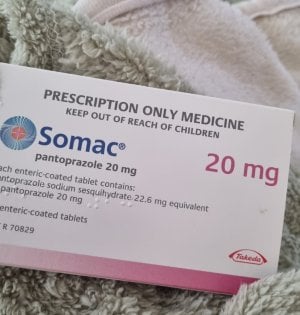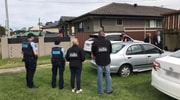Investigation launches after common medications allegedly link to life-threatening diseases
By
Seia Ibanez
- Replies 69
The modern age has brought us many conveniences, including a plethora of medications to treat various ailments.
However, it's becoming increasingly clear that some of these medical marvels may come with hidden costs to our health.
A recent revelation has surfaced that could potentially affect thousands of Australians, particularly those over 60 who are more likely to rely on long-term medication.
A class action lawsuit is brewing, with claims that common prescription and over-the-counter medications, specifically those designed to treat heartburn and gastric reflux, have been linked to serious health risks such as stomach cancer and kidney damage.
This news is particularly alarming for the estimated 100,000 Aussies who may be eligible to join the lawsuit, seeking compensation for the alleged harm caused by these drugs.

To be eligible for the class action, individuals must 'have been diagnosed with stomach cancers or kidney failure after you started taking one (or more) of the PPI drugs'.
The medications in question are known as proton pump inhibitors (PPIs), and they include widely recognised names such as Nexium or Nexium 24HR (esomeprazole), Losec (omeprazole), Somac (pantoprazole), Pariet (rabeprazole), and Zoton FasTabs (lansoprazole).
While some of these require a prescription, others are available over the counter, making them easily accessible to a broad segment of the population.
Craig Allsopp, Joint Head of Class Actions at Shine Lawyers, said PPIs 'reduce the amount of acid made by the stomach and are used to treat acid reflux and stomach ulcers'.
'PPIs are some of the most-prescribed medicines on the market, and consumers typically take PPIs for longer periods and at higher doses than recommended,' he added.
However, this suppression of stomach acid can lead to an increase in gastrin levels, a hormone that, when elevated, has been linked to the formation of cancer cells.
The potential gastric cancers associated with these drugs include neuroendocrine tumours and adenocarcinomas, while the suspected kidney injuries range from acute kidney injury to chronic kidney disorder and kidney failure.
These are serious conditions that can significantly impact one's quality of life and, in some cases, be life-threatening.
The Melbourne-based law firm Shine Lawyers has taken the helm of this class action investigation, partnering with US law firm Milberg Coleman Bryson Phillips Grossman.
They are examining whether drug manufacturers failed to adequately inform consumers about the risks associated with PPIs.
‘The class action will explore whether there is a claim for statutory safety defects, breaches of guarantee and/or negligence by the manufacturers, like AstraZeneca and Merck,' Allsopp said.
It's worth noting that AstraZeneca has already settled kidney claims related to Nexium and Prilosec (marketed as Losec in Australia) for a staggering $637 million in the United States.

Have you or a loved one experienced any adverse effects from taking PPI medications? Share your story with us in the comments below.
However, it's becoming increasingly clear that some of these medical marvels may come with hidden costs to our health.
A recent revelation has surfaced that could potentially affect thousands of Australians, particularly those over 60 who are more likely to rely on long-term medication.
A class action lawsuit is brewing, with claims that common prescription and over-the-counter medications, specifically those designed to treat heartburn and gastric reflux, have been linked to serious health risks such as stomach cancer and kidney damage.
This news is particularly alarming for the estimated 100,000 Aussies who may be eligible to join the lawsuit, seeking compensation for the alleged harm caused by these drugs.

The investigation has been launched after common prescription and over-the-counter drugs have been found to be allegedly linked with stomach cancer and kidney failure. Credit: Shutterstock
To be eligible for the class action, individuals must 'have been diagnosed with stomach cancers or kidney failure after you started taking one (or more) of the PPI drugs'.
The medications in question are known as proton pump inhibitors (PPIs), and they include widely recognised names such as Nexium or Nexium 24HR (esomeprazole), Losec (omeprazole), Somac (pantoprazole), Pariet (rabeprazole), and Zoton FasTabs (lansoprazole).
While some of these require a prescription, others are available over the counter, making them easily accessible to a broad segment of the population.
Craig Allsopp, Joint Head of Class Actions at Shine Lawyers, said PPIs 'reduce the amount of acid made by the stomach and are used to treat acid reflux and stomach ulcers'.
'PPIs are some of the most-prescribed medicines on the market, and consumers typically take PPIs for longer periods and at higher doses than recommended,' he added.
However, this suppression of stomach acid can lead to an increase in gastrin levels, a hormone that, when elevated, has been linked to the formation of cancer cells.
The potential gastric cancers associated with these drugs include neuroendocrine tumours and adenocarcinomas, while the suspected kidney injuries range from acute kidney injury to chronic kidney disorder and kidney failure.
These are serious conditions that can significantly impact one's quality of life and, in some cases, be life-threatening.
The Melbourne-based law firm Shine Lawyers has taken the helm of this class action investigation, partnering with US law firm Milberg Coleman Bryson Phillips Grossman.
They are examining whether drug manufacturers failed to adequately inform consumers about the risks associated with PPIs.
‘The class action will explore whether there is a claim for statutory safety defects, breaches of guarantee and/or negligence by the manufacturers, like AstraZeneca and Merck,' Allsopp said.
It's worth noting that AstraZeneca has already settled kidney claims related to Nexium and Prilosec (marketed as Losec in Australia) for a staggering $637 million in the United States.
Key Takeaways
- Common medications for heartburn and gastric reflux, known as proton pump inhibitors (PPIs), have been allegedly linked to serious health risks such as stomach cancer and kidney failure.
- A class action investigation has been launched by Melbourne-based law firm Shine Lawyers, with an estimated 100,000 Australians potentially eligible for compensation.
- The investigation will focus on whether the manufacturers of these drugs, including well-known brands like Nexium, Losec, and Somac, failed to adequately inform consumers about the potential risks associated with their use.
- A significant settlement has already been reached in the United States, where AstraZeneca paid $637 million in relation to kidney claims against their drugs Nexium and Prilosec (marketed as Losec in Australia).
Last edited:








